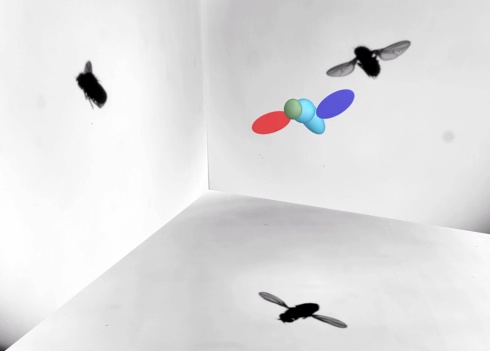Flies Don't Think Much Of Turning

The wings twist out-of-synch with one other as the fly makes a turn.
Attila Bergou / Brown University
WASHINGTON (ISNS) -- The next time a fly dodges your swatter, take a moment to appreciate how maneuverable these little pests are. Fruit flies can make a complete U-turn in one-tenth of the time it takes you to blink.
"That's faster than your eye would be able to perceive," said Attila Bergou of Brown University in Providence, R.I. "It's something that manmade machines can't currently reproduce."
This aerial stunt requires surprisingly little thought on their part, according to experiments conducted by Bergou and colleagues at Cornell University in Ithaca, N.Y.
For years, scientists have known that a fly moving in a straight line synchronizes the movements of its wings. The flies bounce up and down, back and forth with a rowing motion that creates eddies of air, keeping the insect aloft.
But researchers have puzzled over how a fly's simple brain can precisely control each of the 250 wing flaps per second it makes to execute a 180 degree turn.
"Imagine flapping your arms 250 times per second," said Bergou. "You're going to have a really tough time controlling the orientation of your arms."
Using a high speed camera filming at 8,000 frames per second and new image tracking software, Bergou discovered that flies rely less on their brains than previously thought and more on the clever design of their wings. To make a turn, a fly simply twitches a muscle that rolls its shoulder slightly. The wing does the rest, naturally adjusting over the course of a few beats, tilting by about 9 degrees, and creating drag forces that wheel the insect around.
This design principle behind fly U-turns -- wings that are self-adjusting and do the work of turning by themselves -- has attracted the interest of researchers like Robert Wood of Harvard University, who are developing the latest generation of tiny manmade flying machines that buzz not with life but with electricity.
Devin Powell is freelance science journalist based in New York. His stories have appeared online and in print at Nature, Scientific American, the Washington Post, Science News, WIRED, The Best American Science Writing 2012 anthology, and elsewhere.

